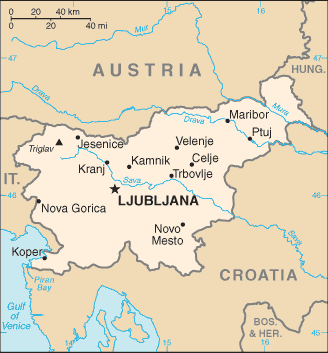Slovenia

Not to be confused with Slovakia (which, confusingly, is called "Slovensko" in its own native language). The flag's slightly different (but only slightly) and it wasn't Warsaw Pact. Though it was Commie Land.
The Republic of Slovenia (Republika Slovenija), one of the states of the former Yugoslavia, arrived into the world of independent states in dramatic style after a ten-day war against the rest of Yugoslavia when it declared independence in 25 June 1991, having held a referendum a few months earlier. After winning that, a low-intensity war with under 100 deaths, Slovenia was rapidly internationally recognised (there had been initial US and EU reluctance), escaped the rest of the horrors of the Balkans Wars and quietly got on with things.
It rapidly became the prize-winner of the new European democracies, democratising rapidly and becoming prosperous. It is the richest of all the post-Communist states in Europe.
In 2004, it joined NATO and the European Union. In the case of the 2004 EU entrants, only Cyprus was better off. Slovenia has since adopted the Euro as its currency.
Slovenia is a parliamentary democracy and a unitary state.
Slovenia has a lot of ecological diversity, with the Alps and Lake Bled being two examples.
The most famous Slovene today that you might heard of is Zeljko Ivanek, an actor who has been on Homicide: Life on the Street and 24 (Andre Drazen)- he frequently plays lawyer types. Another is Melania Knauss-Trump, model and wife of Donald. More intellectual-type folks might have heard of Slavoj Žižek, a critical theorist/philosopher famous for using examples from popular culture to demonstrate philosophical points (one wonders what he would think of TV Tropes). Industrial group Laibach are also Slovenes, named for the German name of the country's capital city of Ljubljana.
Slovenia in fiction
- Veronika Decides to Die by Brazilian writer Paulo Coelho takes place in Ljubljana.
- The Third World War begins when Slovenia declares independence and both US and Soviet forces intervene.
the Slovene flag
